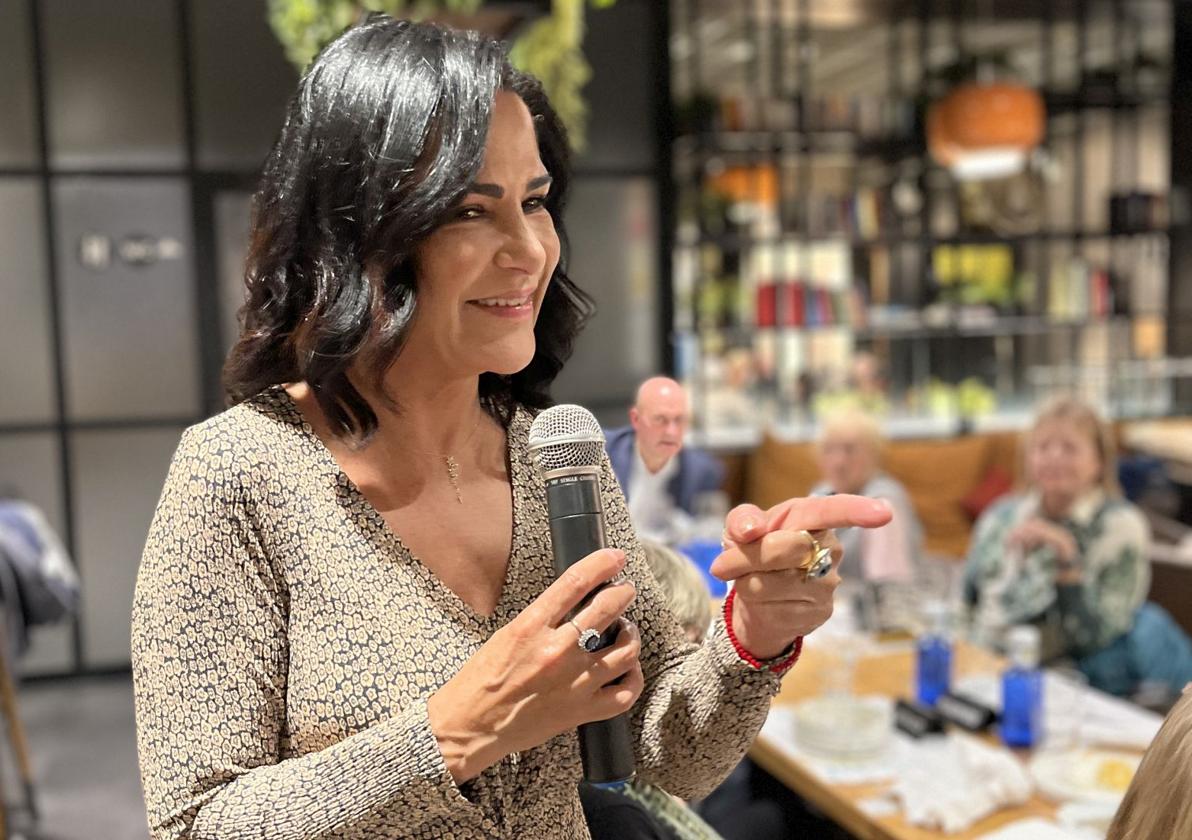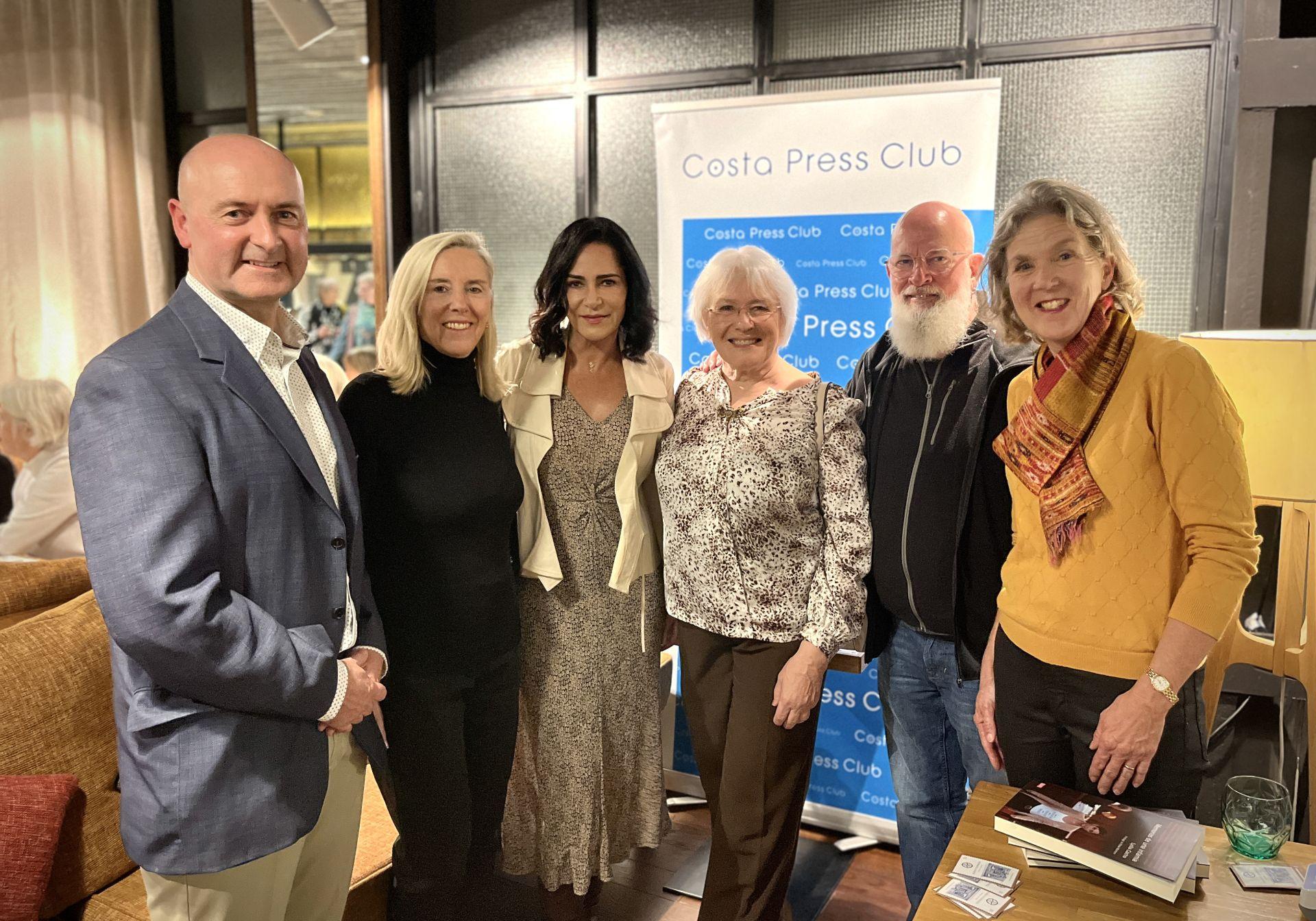

Sections
Highlight

Cristina Vallejo
Malaga.
Thursday, 27 February 2025, 21:03
Lydia Cacho is a Mexican journalist and author of more than twenty books who came to Spain five years ago and has lived in Malaga for the last two. Here she is in exile. In her country, because of her commitment to her profession, giving voice to victims of abuse and investigating the abusers, her life is in danger.
On Monday this week, as guest speaker for the Costa Press Club, she looked back at her professional career that began more than thirty years ago in a Cancun that was not yet what it is today: "The bankers and the president of Mexico, at the end of the seventies, decided to create a new area for tourists. So they created this new economy and started building hotels. And I love scuba diving, and I wanted to be a poet, as well as a writer and a journalist, of course."
She ended up moving there from her native Mexico City and settling after finding love and work. She was the first female journalist to be taken on at a local newspaper. "They tried to send me to cover superficial things, or things that were linked to the development of Cancun. They didn't cover the problems of the local society, the local Mayan ethnic people who used to live there, and who were removed from the area in order to build all these huge hotels."
She did as she was told, but when she had more time, she went to interview those women and children who had aroused her curiosity. First, of course, she had to learn the Mayan language. And while her plan was to write about the impact of tourism on the community, she soon discovered something much deeper and more important to investigate.
"What Mayan women in that area wanted to talk about was gender violence. They wanted to explain how their husbands went to work building the hotels, and then went back home late at night, some of them drunk, and they started being very violent. And then some of them started talking about sexual violence against children."
That first story she encountered was decisive. It connected with what she had heard at home from her psychologist mother, who was sensitive to sexual violence, although, she admits, she was unaware of its enormous dimension. In fact, at the time, very few people were aware of its scope, because the issue was subject to enormous concealment, it was taboo, a great secret. Cacho set about exposing that secret. But not before training and equipping herself with the tools to interview children effectively and sensitively: "You need to understand how not to hurt them again."

That was one milestone in her professional career. Another was in the eighties when she discovered victims of HIV and Aids in her country. She wrote about them, she also spoke on the radio about them, and all that noise led to a phone call late one night from the governor of the state:
"He said, 'Listen, in my state, there's no Aids. In my state, there is none of that. So you have to say that what you printed before is a lie'." She recalls her response: "In your state, that doesn't happen, but in my state, it does happen. So if it happens where I live, I will cover it."
And so she did, although for her it's not just about telling a story, it is also about getting involved and involving others to transform people's lives: she participated in the construction of hospices for HIV and Aids patients.
Her choice of stories and her determination to tell them took her from one newspaper to another. "I'm a reporter and I don't care if people like me or not. I'm not here to be liked. I'm here to tell the truth," she says. She also became her own boss, starting the first feminist magazine in south-east Mexico.
With all these steps, she forged a path that led her to write about all those topics that people don't want to know about because they hurt, but for that very reason it is necessary to talk about them. Especially the trafficking networks of minors, boys and girls. Again, as happened with the young men with Aids, it was not only about telling their story, but also about saving the victims, protecting them, offering them a roof and rebuilding them to the point that many of these people are now activists, as Cacho revealed before an audience of about thirty Costa del Sol international media professionals in Malaga on Monday.
But, as she recalls, "Being a journalist and a human rights activist in Mexico are the two most dangerous professions in my country. And I chose the two of them."
Cacho's activism takes the form not just of her commitment to tell stories and protect her sources, but also of doing what she can to make her work truly useful by bringing perpetrators to justice. But this led her to pay a price: after publishing a book about a paedophile network in Mexico, she was imprisoned and tortured.
"Everybody's telling me I'm a hero but nobody's talking about the children. The brave ones here are the 200 children who told me their stories, who went through therapy to survive, to heal their hearts, their souls, their bodies. The brave ones are the little boys that suffer so much because boys are not supposed to confess they have been raped, right?"
After a career searching for and telling stories, Cacho is clear about one thing: "If you listen to the children you will understand your community."
She risked her life to tell their stories. She suffered illegal arrest, torture and persecution by hired killers. The reward is in the lives she has saved and rebuilt. And also in having discovered that the victims who tell their story are not so much seeking personal reparation as wanting to ensure that no one else suffers what they have endured.
Publicidad
Publicidad
Publicidad
Publicidad
Esta funcionalidad es exclusiva para registrados.
Reporta un error en esta noticia

Debido a un error no hemos podido dar de alta tu suscripción.
Por favor, ponte en contacto con Atención al Cliente.

¡Bienvenido a SURINENGLISH!

Tu suscripción con Google se ha realizado correctamente, pero ya tenías otra suscripción activa en SURINENGLISH.
Déjanos tus datos y nos pondremos en contacto contigo para analizar tu caso

¡Tu suscripción con Google se ha realizado correctamente!
La compra se ha asociado al siguiente email
Comentar es una ventaja exclusiva para registrados
¿Ya eres registrado?
Inicia sesiónNecesitas ser suscriptor para poder votar.